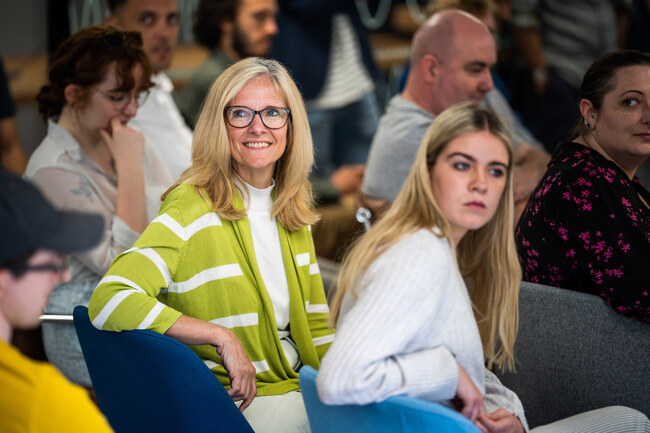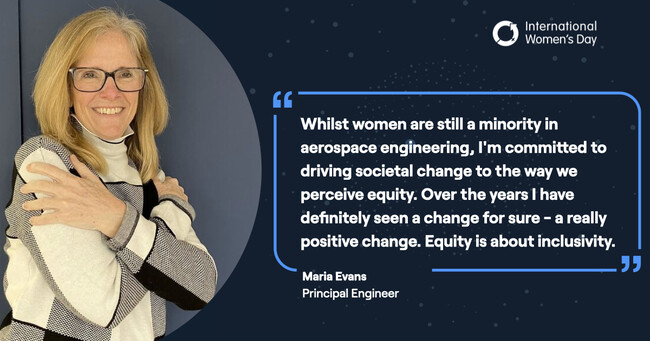Career journey and advice with Principal Engineer Maria Evans
Ramya Sriram
6 min read
6th Mar, 2023
Employee spotlight

On International Women’s Day we wanted to shine the light on gender balance within the GNSS sector. Maria Evans, Principal Engineer explains why she’s incredibly proud to be a role model for young women and girls entering the field. Starting with an aspiration to be the first woman on the moon – Maria has been heavily inspired by many, kept goal focused and never held back. Today, she discusses her journey into the sector and why equity matters.
So how did you get into the GNSS industry?
My journey to GNSS was a bit of a long and winding road, but I got into the space industry because, ultimately, I wanted to be an astronaut. In 3rd grade, I wrote a paper stating that I was going to be the first woman on the moon. I was inspired by seeing men on the moon and I remember thinking I want to do that, I want to go.
As part of that journey, I decided I needed a PhD. At that time, to become an astronaut you either needed to be a military test pilot or have a doctorate. So, I set my sights on the University of Colorado Center for Astrodynamics Research, which is heavily research-based in GNSS. As my first exposure into GNSS, I was captivated by the software tools to support GNSS processing and mission design. This included how to optimize GNSS coverage. I found it fascinating.
How did this early ambition help shape your career choice and did you have any mentors that helped shape who you are today?
I was fortunate to receive support and encouragement all along my path. My early aspirations helped shape all of my academic choices. I took maths and science – which thankfully I had a natural affinity towards. I was certainly fortunate enough to have many older relatives – all men engineers that I looked up to. I had some great mentors in high school too- one in particular who took me under her wing and sent me to physics and engineering competitions. I was going to be an aerospace engineer and I was encouraged to follow my passion.
Mentors continued through the years. At Penn State University I had one particular professor who saw something in me that I’m not sure I saw in myself. A year later he offered me a research position as an undergraduate. He then ended up sponsoring my first master’s degree. He remained a great friend and a mentor throughout my life.
I strive to model each of my mentors when interacting with young students. Helping young people find a way to push through the hard parts to achieve their engineering goals is a priority for me.
Tell us about your early career
Shortly after beginning my PhD program in satellite constellation design, I was hired by a company whose goal was to be the first commercial satellite constellation for communication . It was an exciting opportunity to design the constellation, deployment strategy, and orbit maintenance techniques, which I relished. Four years later, we achieved the goal of being the first constellation to launch. It was a hectic period in my life that included long work hours, lots of travel, graduate school, and eventually having children. I loved it! My dreams of actively supporting launches and space applications were coming true. Without a doubt my proudest career moment was when I was given the opportunity to be the Mission Director for the first launch of our constellation. I managed the satellite control center during the launch and first three months of on-orbit operations and satellite check-out. During that time, I worked closely with engineers of all disciplines as we sorted out problems with the satellites and their operation. It was an exhilarating experience.
International Women’s Day is all about equity this year. What does this mean to you? And have you ever come across any gender barriers in your career?
Whilst women are still a minority in aerospace engineering, I’m committed to driving societal change to the way we perceive equity. Over the years I have definitely seen a change for sure – a really positive change. Equity is about inclusivity. At Focal Point, I don’t get the sense that anyone cares whether you are male or female, or that any aspect of diversity would affect anyone’s opinion of you. It’s refreshing to be judged solely on your ability to do your job. In fact, I’ve never worked in an environment where there’s so much cultural diversity. I listen to the accents and realize that everyone’s from a different country, shaped by a different set of experiences.
When I was first starting out, being a minority gender was certainly a thing. What made a difference for me was the fact I never let stereotypical views stand in my way. I didn’t have a problem speaking up for myself. I was used to delivering talks to crowds of men in my first years of work – always the only female in the room. It had a positive effect – I was the unusual face in the room. But just like anyone else I worked hard to get those projects and worked extremely hard to advance my career. For me – barriers just didn’t exist.

Why do you think the field is so male dominated?
That’s a really complicated question, and I’ve dedicated a lot of time and effort, especially when I was teaching to try to impact change. There’s certainly the cultural impact of not returning to the field after having a family and engineering is one of those fields that it’s harder to go back to when you’ve taken a few years off – it’s harder to convince people that you’re still relevant and current.
Certainly those early years are a really critical time to capture girls’ interests in science and technology but it’s also a very socially challenging time for girls. Thankfully any associated myths for girls liking these subjects are changing for the better. Everybody needs to find that teacher who believes in them – shaping your opinion on belonging in that world and that indeed, there is a path for them to succeed.
Is there anything that you feel could or should be done to make a short-term impact to creating inclusivity?
I think it’s such a complicated problem – but the route cause ultimately lies within our educational system. The reality is every company appreciates the importance of diverse teams. Children need to have role models – a parent, family member or teacher that helps them achieve their dream. I’m certainly passionate about making change and have been involved with several women in engineering forums dedicated to this very topic. I also personally mentor young girls about their career goals and how to help them get there.
What advice would you give to any young women starting out in their careers?
Follow your passion , exploit those opportunities and seek out those mentors who truly believe in you. Whatever subset of engineering that interests you -essentially, If you have the foundational analytical and computer skills, the rest can be learnt.
If you have been inspired by Maria’s story and would like to ask her any questions she can be reached via LinkedIn.
Maria’s current focus is working closely with our customer trials team, analyzing the impact that Supercorrelation™ technology brings to positioning accuracy.







